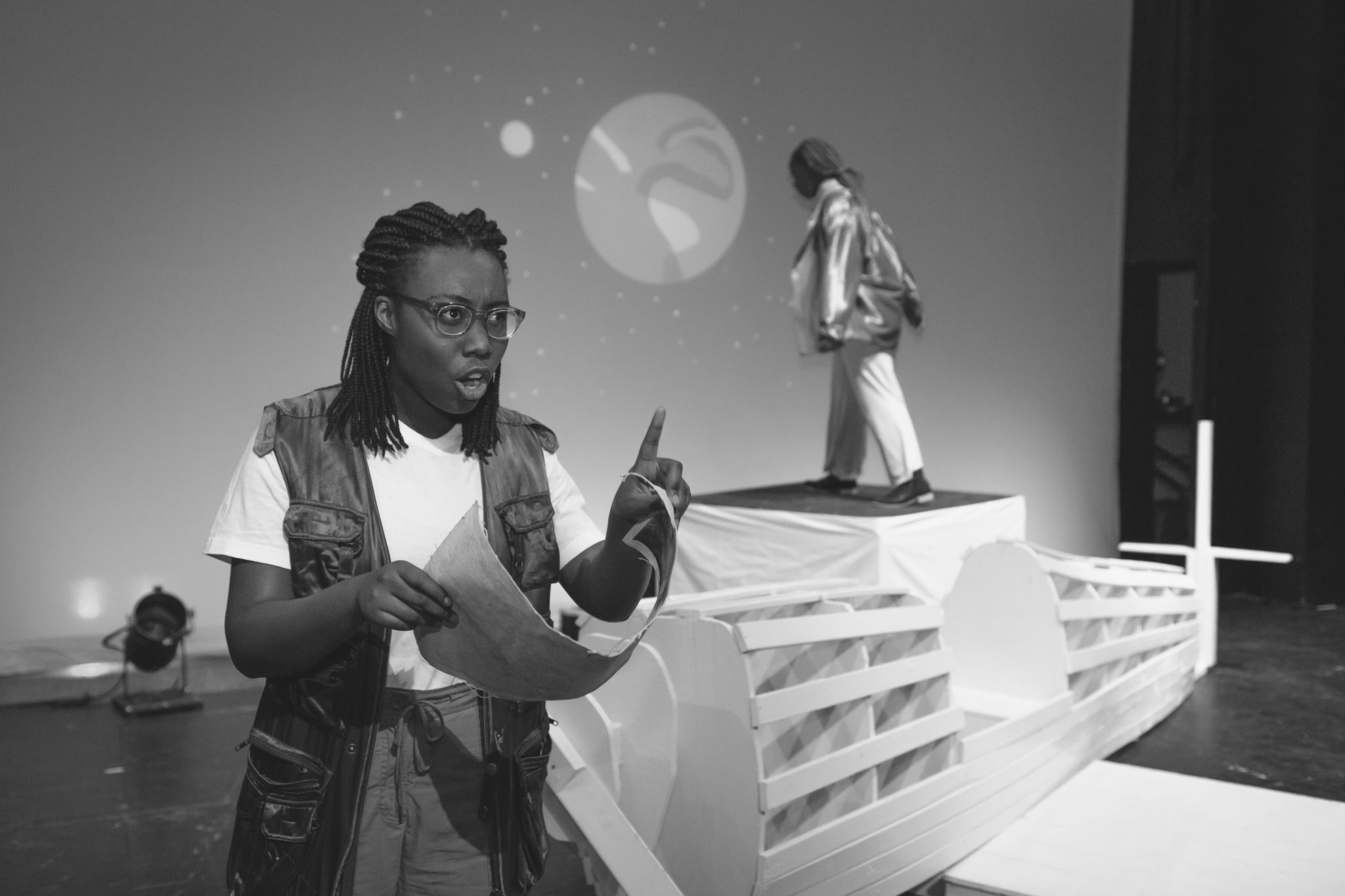
Last week, the Yale Dramatic Association presented its rendition of “The Little Prince” at the Yale Repertory Theatre. In a unique adaptation to the original book by Antoine Saint-Exupéry, director Prisca Dognon ’20 complicates the whimsical nature of the play by addressing the struggles of fleeting childhood innocence as a black woman in society. Every actor cast in the play is a person of color, and most are women.
“The Little Prince” begins with a short poem touching on childhood dreams that resonates through the speakers of the theater. Immediately following the poem, the narrator, played by Vanessa Copeland ’21, emerges onto the stage to speak about his unfulfilled childhood passion for drawing. Now an adult, the narrator has given up his dream for art to become an aviator.
One day, he embarks on a flight and crash lands in the Sahara Desert, with no food or water in sight. The aviator’s desperation increases as he struggles to fix his plane. One day at sunset, he meets the little prince, played by Cleopatra Mavhunga ’22. Dressed in an iridescent purple shirt and a yellow scarf, the light colors of Mavhunga’s costume contrasts the heavy brown shades of the narrator’s aviator outfit, creating a distinct polarity between the youthful innocence of the little prince and the defeatedness of the lost-child aviator. They instantly connect with each other through the aviator’s drawings.
The little prince tells the aviator that he comes from another planet. He speaks of a rose, played by Emily Locke ’19, that blossoms in his planet for the first time. When the little prince calls her the most beautiful thing he has ever seen, she asks “What does beautiful mean?” Through this deceivingly simple question, the audience finds itself questioning the relationship between beauty and friendship, innocence and infatuation. The little prince falls deeply in love with the rose, but ultimately decides to leave her and his planet because her demands become too much.
The little prince then travels through different planets, meeting an eccentric array of grown-ups in his journey. He meets a king, played by Alina Kramp ’22, who is the only inhabitant of his planet — he has no one to rule. The little prince next meets a businessman, played by Oscar Lopéz ’22, who only cares about owning the stars in the sky. With just a large wooden airplane and two raised platforms, the somewhat sparse set design proves to be sufficient through the length of the play, but is not particularly memorable. Every time the little prince visits a new planet and encounters someone new, they both stand together on one of two raised platforms at opposite sides of the stage.
The transition between planets are marked by different songs ranging from “Lullaby” by Tasha to “Time” by Angelo de Augustine. Throughout “The Little Prince,” the songs in the soundtrack were artfully chosen to match the mood of each scene.
Eventually, the little prince lands on Earth, where he sees a wall of roses and becomes disappointed to see that his own rose was not really as special as he had thought. On Earth, he also meets a fox, played by Meghana Mysore ’20. Fearing the prince is a predator carrying a gun, the fox becomes terrified of the little prince. As the little prince, played by a black woman, puts his hands up — saying “I don’t have a gun” — his gestures feel reminiscent of the Black Lives Matter movement. The little prince leaves the audience feeling unsettled, and the scene stands out to be the most striking in “The Little Prince.”
After the fox’s initial wariness, he realizes that the little prince is innocent and asks to be tamed by him. Although the word “tamed” is defined as “to establish ties” within the context of the play, the use of the word alters the dynamic between the fox and the prince, alluding to predator and prey.
As they continue to establish their relationship, Mysore and Mavhunga accurately portray the innocent naivety of childhood friendships. The culminating line of the play and the original book is artfully executed, inspiring the audience with the lines, “It is only with the heart where one can see rightly, what is essential is invisible to the eye.”
At the end of “The Little Prince,” the prince leaves Earth and decides to return to his rose, leaving the narrator with the memory of the little prince in the stars and his own fleeting youth.
At the end of Friday’s show, Irene Vazquéz ’21, who plays the lamplighter and the conceited man, made a statement about the mass faculty withdrawal from the Program of Ethnicity, Race and Migration. In a fitting ending to a play that addresses racial tensions within the context of childhood innocence, Vazquéz ended the play with a statement of the cast’s solidarity with the faculty.
Joyce Wu | joyce.wu@yale.edu .







